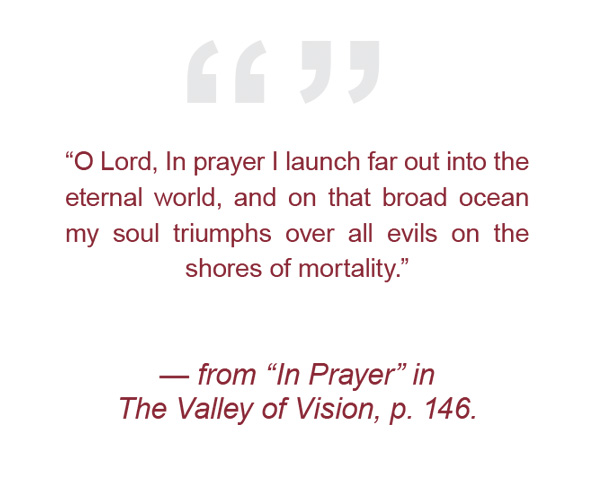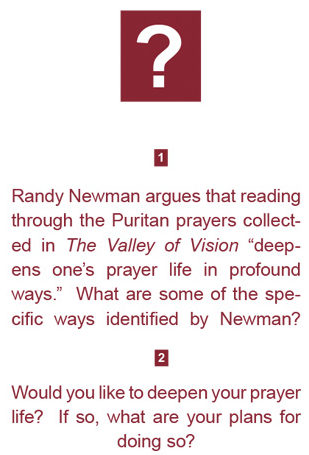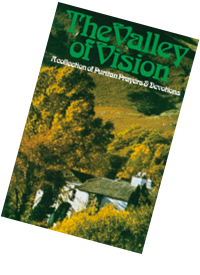Back to series

Recommended Reading:

An Encouragement to Read and Pray through The Valley of Vision
Click here to open a Print - Friendly PDF
 In Knowing & Doing, we often affirm C.S. Lewis’ admonition to “read old books.” We also think there’s great benefit in praying old prayers. So I am delighted to encourage the reading of The Valley of Vision: A Collection of Puritan Prayers & Devotions.
In Knowing & Doing, we often affirm C.S. Lewis’ admonition to “read old books.” We also think there’s great benefit in praying old prayers. So I am delighted to encourage the reading of The Valley of Vision: A Collection of Puritan Prayers & Devotions.
Although the first publication of this collection came as recently as 1975, these prayers were first composed more than three hundred years before then. They were eventually compiled by Arthur Bennett, a Canon of St. Albans Cathedral and tutor in Biblical Theology at All Nations Christian College in England.
Bennett says, in his introduction, “These prayers are drawn from the largely forgotten deposit of Puritan spiritual exercises, meditations and aspiration. They testify to the richness and color of evangelical thought and language that animated vital piety in an important stream of English religious life.”
1Bennett selected these prayers from the collected works of Thomas Shepard, Thomas Watson, Richard Baxter, John Bunyan, Isaac Watts, David Brainerd, Augustus Toplady, Charles Haddon Spurgeon, and several others.
2The prayers are organized according to theological categories:
Father, Son, and Holy Spirit
Redemption and Reconciliation
Penitence and Deprecation
Needs and Devotion
Holy Aspirations
Approach to God
Gifts of Grace
Service and Ministry
Valediction
 A final section offers a morning and evening prayer for “a week’s shared prayers.” Reading through these prayers deepens one’s prayer life in profound ways. Reading an individual prayer can connect you with God in deeper ways than just offering your own words. Second, I’ve seen that the practice of reading these prayers has changed the ways I word my own efforts to connect with God. The Puritan prayers serve as templates and models for my own attempts to adore, confess, give thanks, and intercede with greater weight and thought. I can think of at least three benefits for using The Valley of Vision to deepen our prayer lives.
A final section offers a morning and evening prayer for “a week’s shared prayers.” Reading through these prayers deepens one’s prayer life in profound ways. Reading an individual prayer can connect you with God in deeper ways than just offering your own words. Second, I’ve seen that the practice of reading these prayers has changed the ways I word my own efforts to connect with God. The Puritan prayers serve as templates and models for my own attempts to adore, confess, give thanks, and intercede with greater weight and thought. I can think of at least three benefits for using The Valley of Vision to deepen our prayer lives.
First, we slow down long enough to offer more thoughtful addresses to the God to whom we pray. Consider how much time the following prayer allots to addressing God before asking any petition. (The examples offered below are only short excerpts from longer prayers, although no prayer in the collection is longer than one page):
O God whose will conquers all,
There is no comfort in anything
apart from enjoying thee
and being engaged in thy service;
Thou art All in all, and all enjoyments are what to me
Thou makest them, and no more,
I am well pleased with thy will, whatever it is,
Or should be in all respects.3
 Second, we confess more contritely:
Second, we confess more contritely:
O Lord,
Thou knowest my great unfitness for service,
my present deadness,
my inability to do anything for thy glory,
my distressing coldness of heart.
I am weak, ignorant, unprofitable,
and loathe and abhor myself.
I am at a loss to know what thou wouldst have me do,
for I feel amazingly deserted by thee,
and sense thy presence so little.4
Third, we appreciate the gospel in much deeper ways:
Blessed Lord Jesus,
No human mind could conceive or invent the gospel,
Acting in eternal grace, thou are both its messenger and its message,
lived out on earth through infinite compassion,
applying thy life to insult, injury, death,
that I might be redeemed, ransomed, freed.
Blessed be thou, O Father, for contriving this way,
Eternal thanks to thee, O Lamb of God, for opening this way,
Praise everlasting to thee, O Holy Spirit,
for applying this way to my heart.5
 Many people have worked their way (slowly!) through The Valley of Vision and then started writing their own prayers. The process of thoughtful composition, combined with the physical task of writing the prayers out, engages people in transformative ways. The sheer act of writing things out with paper and pen engages our brains and hearts in ways that just reading does not. Both reading and writing are beneficial. But they do affect us in different ways. (Consider, by the way, copying out by hand a passage of Scripture and see if it does not prove to be a fuller, more holistic encounter with God’s Word.)
Many people have worked their way (slowly!) through The Valley of Vision and then started writing their own prayers. The process of thoughtful composition, combined with the physical task of writing the prayers out, engages people in transformative ways. The sheer act of writing things out with paper and pen engages our brains and hearts in ways that just reading does not. Both reading and writing are beneficial. But they do affect us in different ways. (Consider, by the way, copying out by hand a passage of Scripture and see if it does not prove to be a fuller, more holistic encounter with God’s Word.)
Part of the power of The Valley of Vision flows from the dramatic contrast between the culture of the Puritans in the 1600s and our fast-paced, distraction-filled twenty-first century. They took time to pray, write out prayers, read Scripture slowly, and meditate on God’s Word. We live by a different clock and calendar.
But there’s more to the benefit of this fine book than just navigating the cultural differences between us and the writers of these prayers. The reality of prayer itself demands devotion and diligence. It always has, in every age. It’s easy to give up on prayer. Remember the parable about the widow who kept coming before a judge? The text tells us Jesus told His disciples this story “to show them that they should always pray and not give up” (Luke 18:1 NIV).
When His disciples asked Jesus to teach them how to pray (Luke 11:1), it must have been because they needed — and we, in turn, need — instruction in this lifelong, challenging discipline. And note that Jesus did not respond to their request with, “Don’t worry about it. It’ll just come easily and naturally.” So we shouldn’t be surprised if prayer takes work, training, practice, and improvement of skill over time. The Valley of Vision is one of the best resources I know to help us.
In addition to the paperback, you can also purchase a handsome leather-bound gift edition that adds more than just a touch of class to the experience of reading these magnificent intercessions.
|
Notes:
|
|||

Randy Newman
Senior Fellow for Apologetics and Evangelism, CSLI
Randy Newman is the Senior Fellow for Apologetics and Evangelism at the C.S. Lewis Institute. He has taught at several evangelical seminaries. After serving for over 30 years with Campus Crusade for Christ, he established Connection Points, a ministry to help Christians engage people’s hearts the way Jesus did. He has written seven books, Questioning Evangelism, Corner Conversations, Bringing the Gospel Home, Engaging with Jewish People, Unlikely Converts: Improbable Stories of Faith and What They Teach Us About Evangelism, Mere Evangelism. and his most recent, Questioning Faith: Indirect Journeys of Belief through Terrains of Doubt. Randy has also written numerous articles about evangelism and other ways our lives intertwine with God’s creation. He earned his MDiv and PhD in Intercultural Studies from Trinity International University.

Recommended Reading:
Arthur Bennett, editor, The Valley of Vision: A Collection of Puritan Prayers & Devotions (The Banner of Truth Trust, 1975)
The strength of Puritan character and life lay in prayer and meditation. In this practice the spirit of prayer was regarded as of first importance and the best form of prayer, for living prayer is the characteristic of genuine spirituality. Yet prayer is also vocal and may therefore on occasions be written. Consequently in the Puritan tradition there are many written prayers and meditations which constitute an important corpus of inspiring devotional literature. Too often ex tempore prayer lacks variety, order and definiteness. The reason for this lies partly in a neglect of due preparation. It is here that the care and scriptural thoroughness which others found necessary in their approach to God may be of help. This book has been prepared not to ‘supply’ prayers but to prompt and encourage the Christian as he treads the path on which others have gone before.
 COPYRIGHT: This publication is published by C.S. Lewis Institute; 8001 Braddock Road, Suite 301; Springfield, VA 22151. Portions of the publication may be reproduced for noncommercial, local church or ministry use without prior permission. Electronic copies of the PDF files may be duplicated and transmitted via e-mail for personal and church use. Articles may not be modified without prior written permission of the Institute. For questions, contact the Institute: 703.914.5602 or email us.
COPYRIGHT: This publication is published by C.S. Lewis Institute; 8001 Braddock Road, Suite 301; Springfield, VA 22151. Portions of the publication may be reproduced for noncommercial, local church or ministry use without prior permission. Electronic copies of the PDF files may be duplicated and transmitted via e-mail for personal and church use. Articles may not be modified without prior written permission of the Institute. For questions, contact the Institute: 703.914.5602 or email us.
-
Recent Podcasts
A Welcome Change in Apologetics
by Randy Newman, Aimee Riegert on April 19, 2024We’re burdened for our friends who don’t know...Read More
-
Questions That Matter Podcast – Samuel James and Digital Liturgies
by Samuel James, Randy Newman on April 19, 2024
-
The Side B Stories – Dr. James Tour’s story
by Jana Harmon, James Tour on April 12, 2024
-
Recent Publications
Isn’t Morality Relative?
by Christopher L. Reese on April 1, 2024It is widely accepted in the Western world...Read More
-
Do Muslims and Christians Worship the Same God?
by Andy Bannister on March 1, 2024
-
Artificial Intelligence and Its Impacts on Humanity
by John Lennox on February 13, 2024
0
All Booked
0.00
All Booked
0.00
All Booked
22140
GLOBAL EVENT: Keeping the Faith From One Generation To Another with Stuart McAllister and Cameron McAllister, 8:00PM ET
https://www.cslewisinstitute.org/?event=global-event-keeping-the-faith-from-one-generation-to-another-with-stuart-mcallister-and-cameron-mcallister-800pm-et&event_date=2024-05-17®=1
https://www.paypal.com/cgi-bin/webscr
2024-05-17

Next coming event
Days
Hours
Minutes
Seconds
GLOBAL EVENT: Keeping the Faith From One Generation To Another with Stuart McAllister and Cameron McAllister, 8:00PM ET
On May 17, 2024 at 8:00 pmTags
Speakers

Randy Newman
Senior Fellow for Apologetics and Evangelism, CSLI
Team Members

Randy Newman
Senior Fellow for Apologetics and Evangelism, CSLI
Randy Newman is the Senior Fellow for Apologetics and Evangelism at the C.S. Lewis Institute. He has taught at several evangelical seminaries. After serving for over 30 years with Campus Crusade for Christ, he established Connection Points, a ministry to help Christians engage people’s hearts the way Jesus did. He has written seven books, Questioning Evangelism, Corner Conversations, Bringing the Gospel Home, Engaging with Jewish People, Unlikely Converts: Improbable Stories of Faith and What They Teach Us About Evangelism, Mere Evangelism. and his most recent, Questioning Faith: Indirect Journeys of Belief through Terrains of Doubt. Randy has also written numerous articles about evangelism and other ways our lives intertwine with God’s creation. He earned his MDiv and PhD in Intercultural Studies from Trinity International University.






